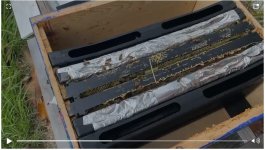Today I would like to share my experience of saving hopeless colonies.
A friend of mine in New Zealand runs an apiary in his backyard. It so happened that by May, the tick had weakened the bees very much and the worst thing was that the queen was lost. A quarter of the bees remained on one side of the frame. Somewhere 100-150 pieces.
The situation was hopeless... Everyone advised him to give up this idea, and start anew in the spring. But we are not looking for easy ways, and what else can beekeepers talk about forever - only about bees. After discussing the weather situation in New Zealand in winter, we came to the conclusion that the chances of success are 50/50.
A queen was bought, there was a sealed brood in the nest, which was destroyed - there was a tick in it and if the bees were born, they would still be unviable. The colony was transplanted to a clean honeycomb and a good honey-pergov frame was added. The queen was successfully planted, and a strip was placed against the tick to knock down the tick that was still on the bees. The flight path was shortened so that only one bee could pass. The extra frames were removed from the hive, and only two were left - an empty frame and a honey frame. From the sides they were clamped with feeders that were wrapped in foil. A thick towel was still covered over the frames. The mesh bottom was covered with cardboard. What it was done for - to create the right microclimate in the nest. This was done somewhere in the middle of may.
The first month was critical - until a young bee was born, and then it was already possible to relax and control the availability of food in the nest.
At the time of writing this post on the calendar on 08/31/2022, bees feel great, and already occupy about 3 frames. I think this is a very good result. I consider the experiment a success, my friend is happy. Hooray!!!
* I want to draw attention to the fact that this colony was one. There were no other bees within a radius of 100 meters. The option of looting is possible if there would be other bees nearby.
A friend of mine in New Zealand runs an apiary in his backyard. It so happened that by May, the tick had weakened the bees very much and the worst thing was that the queen was lost. A quarter of the bees remained on one side of the frame. Somewhere 100-150 pieces.
The situation was hopeless... Everyone advised him to give up this idea, and start anew in the spring. But we are not looking for easy ways, and what else can beekeepers talk about forever - only about bees. After discussing the weather situation in New Zealand in winter, we came to the conclusion that the chances of success are 50/50.
A queen was bought, there was a sealed brood in the nest, which was destroyed - there was a tick in it and if the bees were born, they would still be unviable. The colony was transplanted to a clean honeycomb and a good honey-pergov frame was added. The queen was successfully planted, and a strip was placed against the tick to knock down the tick that was still on the bees. The flight path was shortened so that only one bee could pass. The extra frames were removed from the hive, and only two were left - an empty frame and a honey frame. From the sides they were clamped with feeders that were wrapped in foil. A thick towel was still covered over the frames. The mesh bottom was covered with cardboard. What it was done for - to create the right microclimate in the nest. This was done somewhere in the middle of may.
The first month was critical - until a young bee was born, and then it was already possible to relax and control the availability of food in the nest.
At the time of writing this post on the calendar on 08/31/2022, bees feel great, and already occupy about 3 frames. I think this is a very good result. I consider the experiment a success, my friend is happy. Hooray!!!
* I want to draw attention to the fact that this colony was one. There were no other bees within a radius of 100 meters. The option of looting is possible if there would be other bees nearby.



